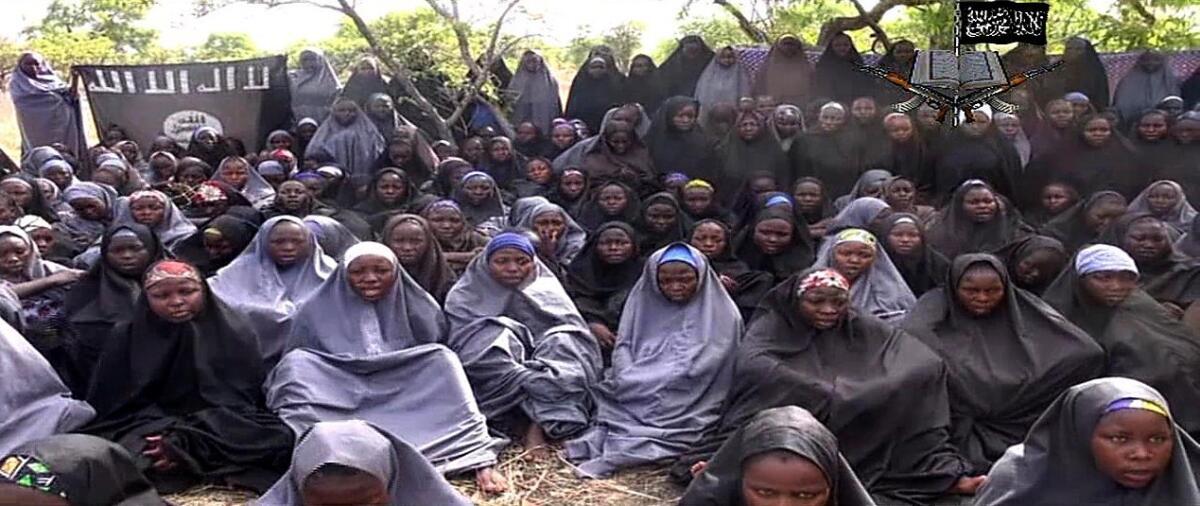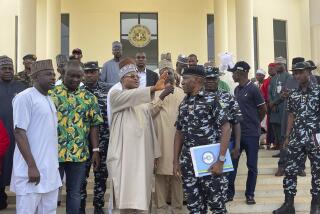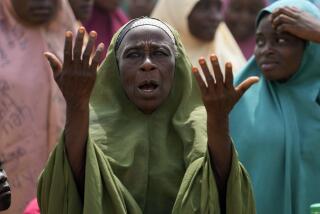Nigeria announces truce with Boko Haram; fate of schoolgirls unclear

- Share via
Reporting from Johannesburg, South Africa — Nigerian officials Friday announced they had agreed to a cease-fire with Boko Haram, but their statements left confusion over the fate of 219 schoolgirls kidnapped by the militant group in April.
Defense chief of staff Alex Badeh announced the truce, saying all Nigerian military units had been instructed to abide by the accord.
Hassan Tukur, an aide to Nigerian President Goodluck Jonathan, said there was also an agreement for the release of the captive girls after talks with Boko Haram representatives mediated by officials from Chad, new agencies reported.
But Nigerian Defense Ministry spokesman Maj. Gen. Chris Olukolade said the schoolgirls’ release was still under negotiation, the Associated Press reported.
Nigerian officials haven’t commented on what was being offered to Boko Haram in return for the girls’ freedom. The group has previously demanded the release of prisoners as a condition for freeing the hostages.
Nigeria’s military announced months ago it knew the location of the girls but said it would not launch a military operation to recover them because of the risk of casualties.
A government spokesman, Mike Omeri, said at a news conference Friday that Boko Haram representatives said during negotiations that the girls were in good health.
Analysts were cautious about the news, with Nigerian officials reporting countless false dawns in its long confrontation with the militant group -- and with Nigeria facing presidential and parliamentary elections in February. Jonathan is expected to announce in coming weeks that he will run for a second term.
There have been several efforts in recent years to negotiate peace with Boko Haram, which has battled the army for control of northern Nigeria and sought to impose a strict form of Islam in the region. None of the attempts has come to anything.
Jonathan, desperately in need of some good news, has faced harsh criticism over his slow response to the girls’ abduction. His supporters accuse the #BringBackOurGirls campaign of being opposition stooges, using the girls’ fate for political mileage.
Hundreds more women and girls have been abducted by Boko Haram in recent years – and dozens of schoolboys and teachers were killed by the group that opposes secular education and other aspects of Western culture. But the mass kidnapping in April and the BringBackOurGirls hashtag coined by Nigerian activists attracted global attention to the schoolgirls’ plight.
The schoolgirls had gathered at a lightly guarded boarding school on the outskirts of the town of Chibok for their final exams when the attack happened. Gunmen loaded 276 girls into trucks and drove away. Parents and local officials accused Nigeria’s military of failing to pursue and recover the girls.
According to Nigerian officials, 57 escaped and 219 remain in captivity.
Boko Haram leader Abubakar Shekau later released a video describing the girls as slaves and threatening to “sell them in the market.” A video of the girls reciting the Koran and dressed in Islamic clothing was also released.
Nigeria, a country of 170 million, is roughly divided between the north, which is predominantly Muslim, and the mostly Christian south.
Boko Haram emerged over a decade ago in response to Nigeria’s corrupt ruling class and opposes what it sees as the taint of Western influences such as taxation, democracy and automatic teller machines. It has become increasingly fragmented, with some factions opposed to the group’s violent attacks on Muslims.
Boko Haram’s assaults initially focused on police stations and military posts. In recent years, the group has stepped up its violence, killing thousands of people in attacks on villages, churches, schools, markets, open-air video entertainment venues, bus stations and other crowded public places.
Follow @robyndixon_LAT for news out of Africa
More to Read
Sign up for Essential California
The most important California stories and recommendations in your inbox every morning.
You may occasionally receive promotional content from the Los Angeles Times.










